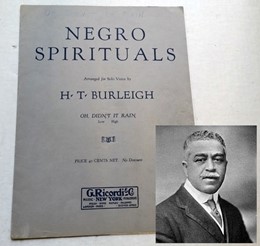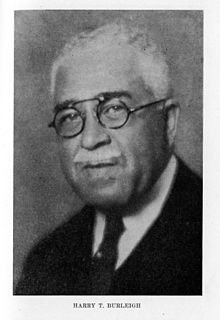
Spirituals: Solo Arrangements

Harry Thacker Burleigh (1866-1949) and an arrangement of the African American Spiritual "Oh, Didn't It Rain"
At the end of the Civil War, many educational institutions were established where African Americans received an education that did not erase their rich oral musical tradition from their minds. They knew that they needed to preserve their music so that future generations could be fully aware of their beauty. To that end, they would have to notate their songs. The musical notation of African American spirituals led to choral arrangements in four- and eight-part harmony and solo voice and piano accompaniment arrangements.
Harry Thacker Burleigh (1866-1949), the African American classical composer, arranger, and singer, is considered the first to arrange spirituals as a solo art song. These songs, originally sung on the plantation, were now moved from an oral tradition onto the concert stage, with Burleigh closing his concerts by singing groups of spirituals. The new life breathed into these works allowed concert singers to access these works for the first time. In addition, as these songs now arranged in the art songA song of serious artistic purpose designed for the concert hall as opposed to traditional songs or folk songs. An art song is usually sung by a solo voice with accompaniment. In German it is called lieder, in French, chanson. An art song is a complete composition in itself and is not part of a larger work such as an opera or an oratorio. tradition began to enjoy wider circulation, they attracted noted composers and singers. Listen to a group of concertized spirituals arranged by Burleigh and sung by baritone Justin Austin. The spirituals that you will hear are grouped as follows in this program:
- "My Lord, What a Morning"
- "I Don't Feel No-ways Tired" [for the score click here]
- "Oh, Didn't It Rain"
- "O Rocks, Don't Fall on Me"

Harry T. Burleigh
Three noted singers who attracted to this new form of composition were the lyric tenor Roland Hayes (1887-1997), the operatic contralto Marian Anderson (1897-1993), and the concert artist and actor Paul Robeson (1898-1976). All three championed this style of work on the concert stage to wide acclaim.





